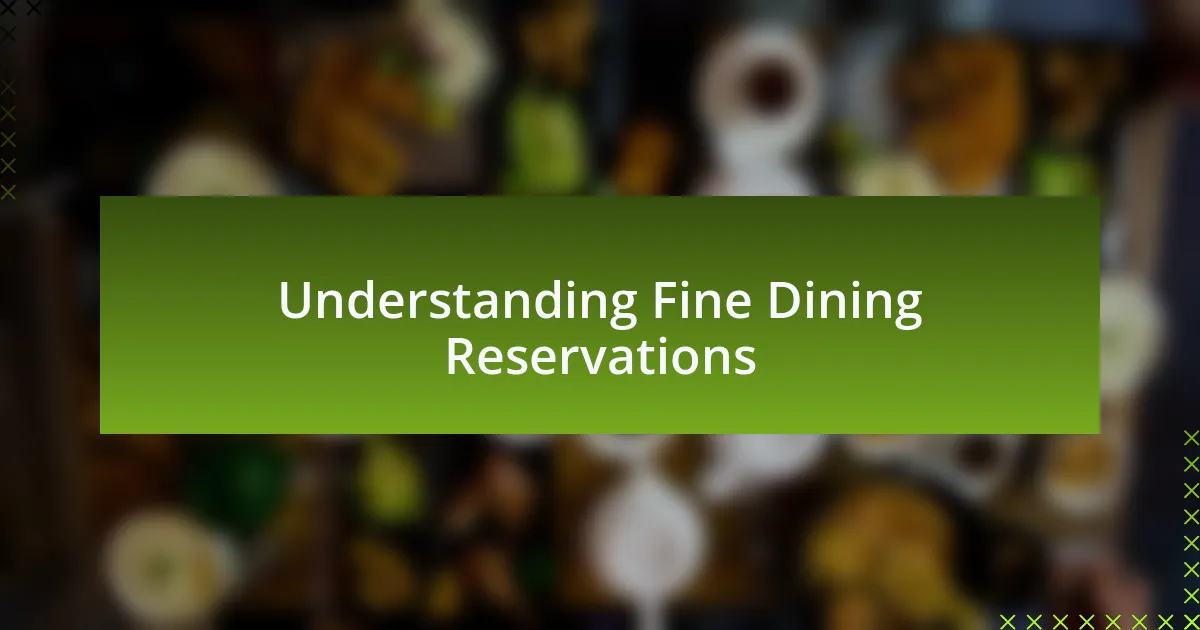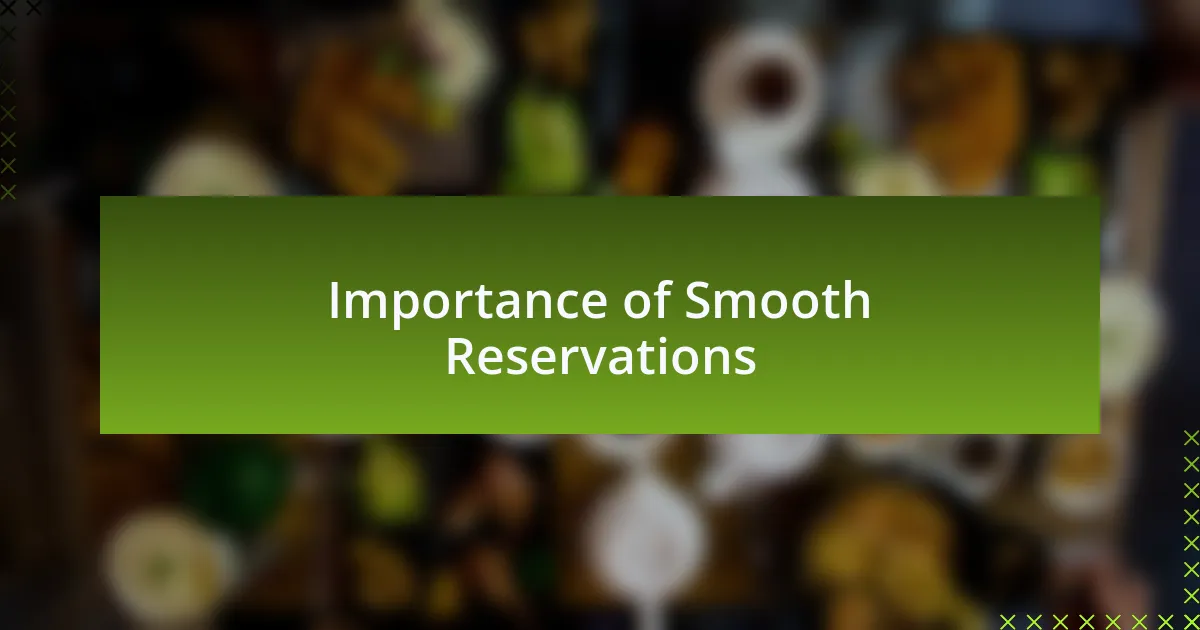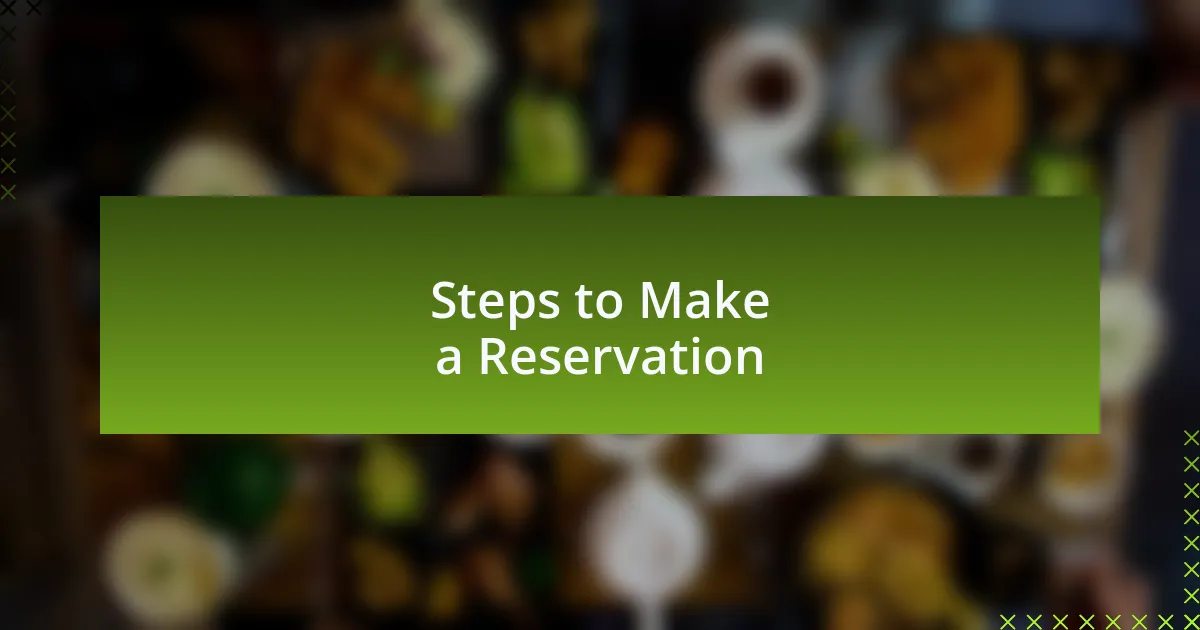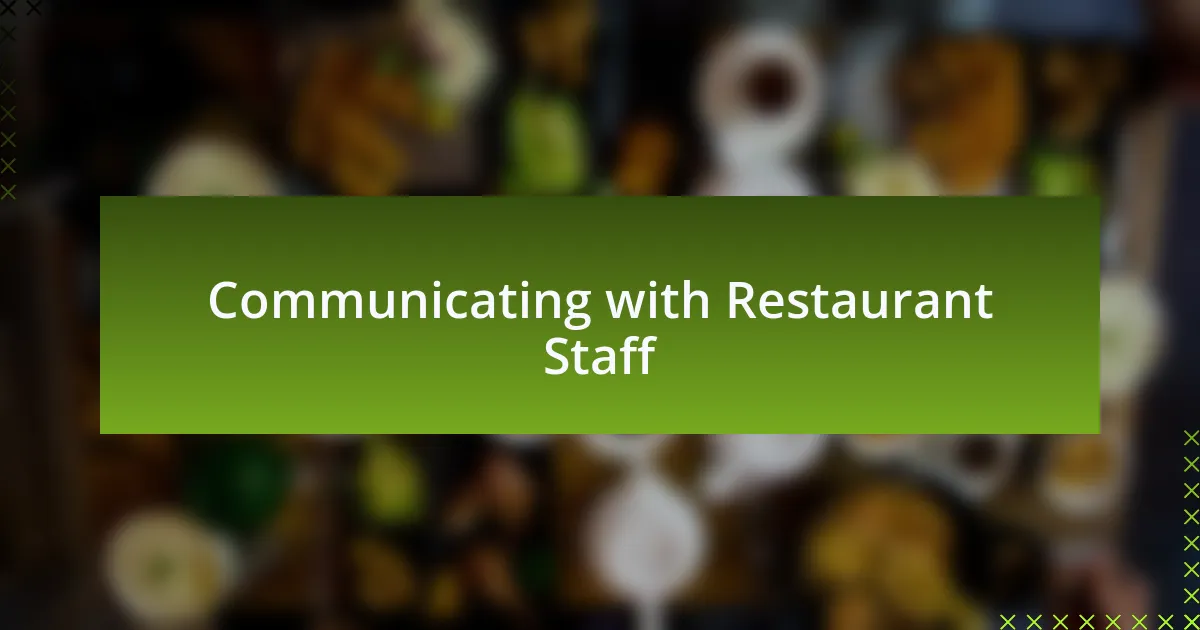Key takeaways:
- Fine dining reservations create anticipation and enhance the overall dining experience, involving attention to detail such as ambiance and timing.
- Smooth reservations build guest confidence and set a positive tone for the evening, reflecting the professionalism of the restaurant.
- Clear communication with restaurant staff is essential for confirming details and special requests, creating a partnership that can elevate the experience.
- Planning ahead and using efficient reservation systems can minimize stress and contribute to a memorable dining occasion.

Understanding Fine Dining Reservations
When I think about fine dining reservations, I am reminded of the anticipation that builds with each booking. It’s not just about securing a table; it’s about curating an experience that often involves a special occasion, a significant milestone, or even just a desire to savor exquisite cuisine. Have you ever felt that mix of excitement and nervousness when you’re about to indulge in a highly-recommended restaurant?
Understanding the nuances of fine dining reservations can enhance your overall experience. These establishments often have specific protocols, like requiring a credit card to hold your table or having a cancellation policy that can feel intimidating. I remember once canceling a reservation at the last minute and feeling guilty due to the restaurant’s policy—it taught me the importance of communicating openly and understanding their guidelines.
Moreover, the ambiance often sets the tone for the meal, and reserving a specific time can influence that experience. Imagine walking into a well-lit restaurant, where the table is just the right distance from the kitchen, allowing you to savor the aroma without being overwhelmed by the hustle and bustle. While some might think that reservations are merely a formality, I find that they’re a way of ensuring that every detail of the evening aligns perfectly for a memorable dining experience.

Importance of Smooth Reservations
Smooth reservations are paramount in the fine dining world, as they set the foundation for a memorable evening. I recall a time when I tried to book a table at a trendy restaurant just a week prior to a birthday celebration. The anxiety I felt when my requested time was fully booked was palpable. That experience reinforced my belief that making reservations well in advance not only secures your spot but also secures your peace of mind.
When reservations are seamless, guests can channel their energy into enjoying the meal rather than worrying about logistical issues. I remember entering a restaurant with a confirmed reservation, and the host greeted me by name. It immediately put me at ease and made me feel valued. Isn’t that one of the core desires we have as diners—to be recognized and appreciated?
Moreover, an efficient reservation process reflects positively on the restaurant’s overall professionalism. It communicates respect for the guest’s time and enhances anticipation for the dining experience. To illustrate, I had once dined at a restaurant where the seamless reservation led to a perfectly timed meal; each course arrived just as we had finished the previous one. Doesn’t that kind of thoughtful execution elevate the entire dining experience?

Steps to Make a Reservation
Making a reservation at a fine dining restaurant begins with choosing the right platform. I often prefer the restaurant’s official website because it typically offers the most accurate information, including menu specials and current availability. Have you ever noticed how frustrating it is to find conflicting details on third-party sites?
Next, I always double-check the dining date and time before submitting my reservation. Once, I made a mistake by booking a time that didn’t align with my schedule, leading to a frantic scramble to change it. Taking that extra moment ensures I’m not only securing my spot but also avoiding unnecessary stress later.
Finally, I make a point to note any special requests or occasions in the reservation form. Whether it’s a dietary requirement or a celebration, mentioning these details can enhance the dining experience. For instance, I once celebrated an anniversary, and the restaurant surprised us with a personalized dessert that made the evening unforgettable. Isn’t that kind of extra touch what truly makes a night special?

Communicating with Restaurant Staff
When I communicate with restaurant staff, whether it’s via phone or email, I always strive for clarity and friendliness. I find that a warm tone makes all the difference, as it sets a positive vibe right from the start. Have you ever felt more appreciated when someone is genuinely nice to you? I know I have.
It’s also essential to ask questions if something isn’t clear. I remember once I was curious about a specific dish’s ingredients due to a food allergy. By simply inquiring, I not only received helpful information, but the staff also seemed genuinely invested in ensuring my safety. This level of attentiveness not only eases my mind but also builds trust.
Moreover, I find that confirming details like reservation time and any special requests with the staff creates a sense of partnership. There was a time when I mentioned a special milestone during the booking, and by the end of the evening, the staff had prepared a surprise that made the occasion even more memorable. It reminded me how effective communication can transform an ordinary meal into an extraordinary experience.

Tips for a Hassle-Free Experience
One of the best tips I can offer for a hassle-free experience is to make your reservation well in advance, especially if you’re visiting during peak times. I once tried to book a table for a special anniversary just a week beforehand and ended up disappointed. Planning ahead not only guarantees a seat but builds excitement as you anticipate the meal.
Using a straightforward online reservation system can also minimize any potential stress. I find that platforms that allow you to specify dietary restrictions or preferences streamline the process significantly. Just the other week, I used such a system, and I was pleasantly surprised when the restaurant confirmed my vegan request, making me feel valued and understood.
Lastly, if you have an intricate request or a large party, consider following up with a phone call after making the reservation. I’ve learned that a quick chat can clarify any special arrangements and ease worries. After one particularly elaborate booking for a family reunion, the restaurant surprised us with a reserved space that felt specially crafted for our gathering, transforming what could have been a mere dinner into a cherished memory.

Reflecting on Your Dining Experience
Reflecting on a dining experience can truly enhance your appreciation of a meal. After a wonderful dinner, I often take a moment to think about the flavors, presentation, and ambiance. I remember one time, savoring each bite of a perfectly seared steak, I realized that the atmosphere—the soft lighting and gentle music—elevated the entire experience. How often do we pause to truly appreciate what we’re consuming?
I also find it helpful to note what made the meal memorable. Was it the unique dish that introduced me to new flavors, or perhaps the server who went above and beyond? One memorable evening, the sommelier recommended a wine pairing that not only complemented the food but opened my eyes to a whole new world of taste. Reflecting on these aspects not only enriches my dining knowledge but shapes my future choices.
Moreover, I believe it’s important to share these reflections with friends or even the restaurant staff. I once spoke to the chef after enjoying a delicious dessert, expressing how the balance of sweetness and bitterness resonated with me. Their genuine smile and appreciation in return highlighted a connection that went beyond just a meal—it became an experience we both cherished. Have you ever considered how sharing your thoughts could deepen your connection to the dining world?